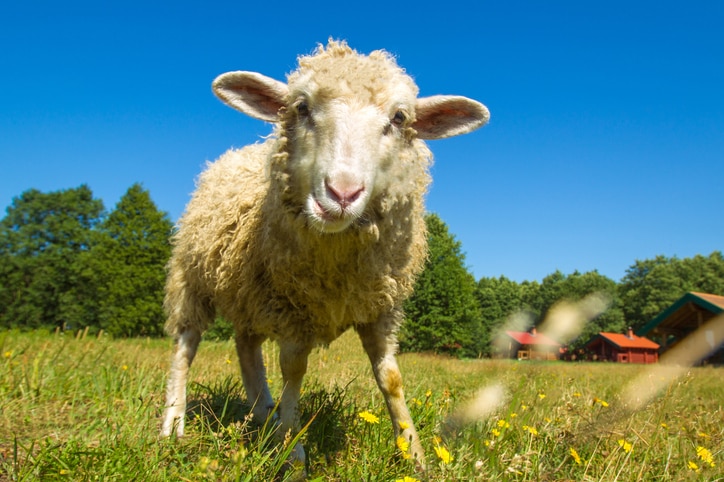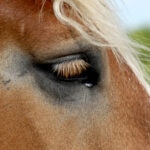How Long Do Sheep Live?

Photo by Gri-spb/iStock/Getty Images Plus
If the idea of a small flock of rescued sheep grazing in your backyard sounds idyllic, you’re not alone. These gentle grazers can be a joy to care for, but they’re a long-term commitment.
So how long do sheep live? Here’s what to expect and how to help your wooly friends live their best life.
Key Takeaways
- Sheep kept as companions typically live 10 to 12 years, but with proper TLC, some can reach their mid-20s.
- Sheep need to live with sheep friends to reduce stress and support their well-being.
- Space, fencing, and shelter are essential for safety, grazing, and protection from predators and harsh weather.
- Balanced nutrition and species-specific minerals help prevent illness—especially avoiding copper-rich goat feed.
- Regular veterinary care, shearing, and keeping an eye on your flock are key to preventing common health issues like parasites, flystrike, and bloat.
What’s the Typical Sheep Lifespan?
Sheep typically live 10 to 12 years, but when properly cared for as pets or companions, it’s common to see them living well beyond that. Methuselina, a well-cared-for Merino sheep, lived to be 25 years old.
How To Give Your Sheep a Long Life
You can give your sheep the best chance at a long life by giving them what they need to thrive.
Habitat
Wild sheep can roam for miles each day while grazing, says Skyler Bentley, the animal care manager at the University of Arizona College of Veterinary Medicine.
But domestic sheep need less room to wander. “The rule of thumb, generally, is that one acre is enough room for two to three sheep,” Bentley says. Too little pasture space can lead to overgrazing, malnutrition if feed isn’t supplemented, and increased risk of parasites.
Bentley recommends fencing to protect from predators, since wild dogs and coyotes are a threat to sheep. A woven wire field fence with 6 x 6-inch spacing works well to prevent lambs from slipping through.
A three-sided shelter is also recommended to give sheep a safe place to escape predators and protection from wind, rain, and extreme temperatures. While sheep are generally hardy, they can be susceptible to weather-related illness or death.
Socialization
Sheep are herd animals who rely on safety in numbers to protect against predators and serve as companions for their well-being. Keeping at least two sheep together not only reduces stress but also supports a longer lifespan.
“There are few things more stressful to a sheep than being away from other sheep,” Bentley says.
Sheep can still enjoy the company of other species, like goats, but it’s not a replacement for having fellow sheep to eat, sleep, and graze with, says Jen Schurman, president of Shepherd’s Rest Goat & Sheep Rescue.
Diet
Sheep can often get the nutrients they need from grazing on a high-quality pasture that’s available year-round, Bentley says.
A high-quality pasture has healthy forage that isn’t overgrazed—usually it’s at least 4 inches tall for grasses like Bermuda grass or bahiagrass—and few to no bare spots. Pastures can include both grazing (grasses) and browsing (brush and weed control) areas.
If your sheep have been on a dry lot—that is, a vegetation-free area—all winter, introduce them gradually to fresh spring grass. Too quick an introduction can lead to sheep diarrhea, known as scours, and it can cause dehydration that could lead to death in just a few hours, especially in lambs.
Schurman provides her flock with supplemental hay, grain, and the occasional treat. Sheep should also have free-choice, species-specific minerals available year-round, which help support proper growth, reproduction, and overall health.
If you’re housing sheep with other animals, keep in mind that goat feed is toxic to sheep because it often contains higher levels of copper that can build up in a sheep’s liver and cause sudden poisoning, leading to liver damage, anemia, and death.
To prevent copper poisoning, Schurman feeds animals at her rescue separately at night, when each species is tucked into their own stalls with their own feed.
Veterinary Care
Sheep require regular veterinary care, even though finding a veterinarian with knowledge of sheep can be difficult (and pricey). You can search the American Association of Small Ruminant Practitioners (AASRP) directory to find a qualified vet in your area.
At a minimum, your flock should have a yearly veterinary checkup, as long as you’re comfortable administering vaccines, trimming hooves, and deworming your flock at home between annual visits.
One of the most important vaccines for sheep is the Clostridium perfringens types C and D and Tetanus (CD&T) vaccine, which needs to be given on a strict schedule when they’re young lambs, then continued with regular boosters as adults.
Without protection, these infections are often fatal—type C causes severe intestinal disease; type D targets fast-growing lambs; and tetanus attacks the nervous system.
Shearing
Wild sheep don’t need to be sheared, but domestic sheep have been bred to grow thicker, heavier fleece that they need help with.
Plan on shearing at least once a year, Bentley says.
Shearing isn’t as simple as giving your sheep a haircut, and if done incorrectly, it can be stressful, painful, or even dangerous for the sheep.
“I have my flock shorn by a professional shearer,” Schurman says, which makes it safer for the animals.
What Are Some Common Health Issues for Sheep?
Sheep tend to hide illness and are “more guarded in letting you know if there’s a problem,” Schurman says.
This is why Bentley recommends learning to take a sheep’s vital signs, or TPR: temperature, pulse, and respiration.
Schurman checks her flock twice a day, monitoring how much they eat and drink and keeping an eye on their manure for changes in color or consistency, which can indicate illness.
Some common—but largely preventable—health issues include:
- Hoof rot (foot rot): A highly contagious bacterial infection of the foot and hoof, often caused by prolonged wet conditions or trauma. It can lead to lameness if untreated.
- Fly strike: A potentially fatal infestation where flies lay eggs in moist or soiled fleece, and the hatching larvae (maggots) feed on the sheep’s skin.
- Fleece rot: A bacterial infection of the skin along with matting and discoloration of the fleece, usually due to prolonged dampness. Fleece rot increases the risk of fly strike.
- Overheating/heat stress: Can be fatal when sheep cannot cool themselves to normal body temperature. The risk increases when temperatures hit 84 F and above.
- Internal parasites: Lungworms, stomach worms, liver flukes, and coccidia. Stomach worms can cause sudden death in young sheep due to anemia.
- External parasites: Fleeceworms (wool maggots), secondary screwworms, scabies, sheep lice, ticks, and keds (wingless flies).
- Respiratory illness: Can include pneumonia and other infections affecting the lungs and airways.
- Bloat: A life-threatening condition where gas accumulates in the rumen, causing pressure on other organs.
“These are animals who deserve love and compassion, no different than a dog or a cat,” Schurman says.
FAQs About Sheep Lifespan
How long do sheep live naturally?
Wild sheep, such as bighorn sheep, typically live 9 to 14 years. The typical domestic sheep life expectancy is 10 to 12 years, but with more attentive care, pet sheep are living well into their 20s.
How old is the oldest sheep?
According to Guinness World Records, the oldest sheep lived to be 28 years and 51 weeks old, passing away in 1989. Another notable sheep, Methuselina, lived 25 years.
Do sheep get attached to humans?
Yes, sheep get attached to humans. While they’re known for being shy or cautious, they can still form close bonds with their caregivers and enjoy their company.



